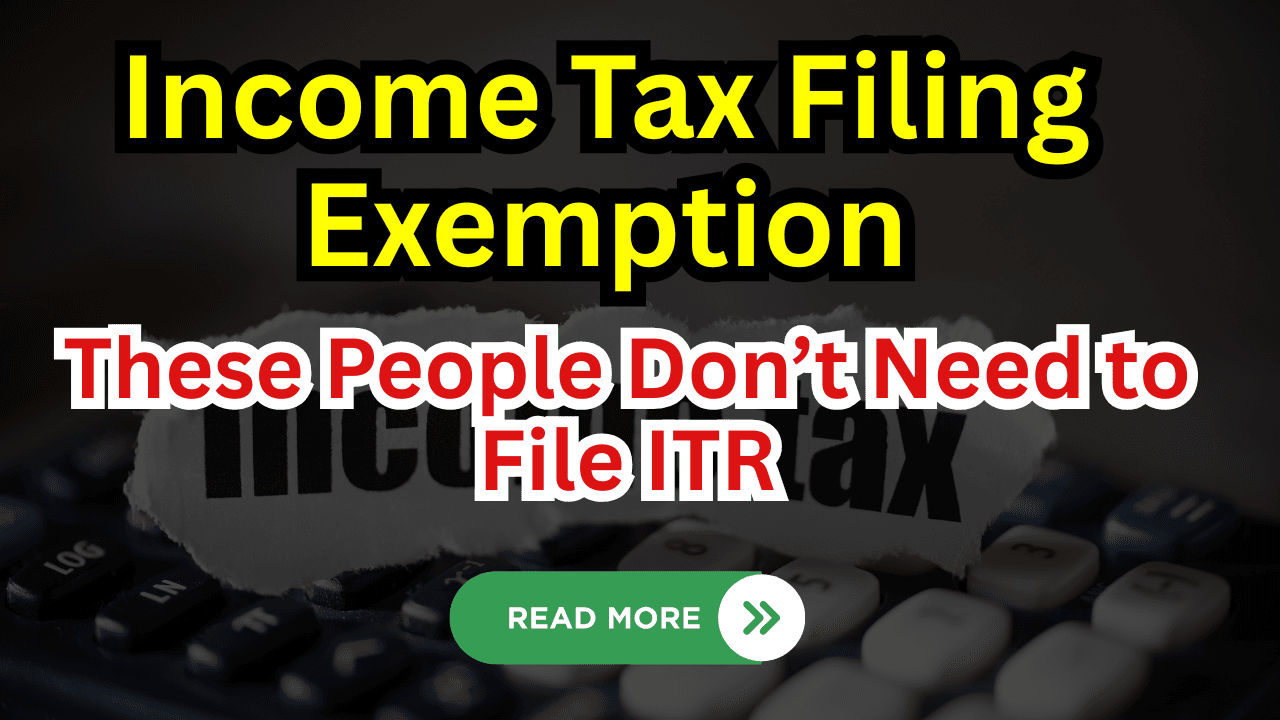Income Tax Filing Exemption
Income Tax Filing Exemption As a new financial year begins, taxpayers across India are gearing up to file their Income Tax Returns (ITR). While most salaried employees, business owners, and professionals are preparing documents and calculating liabilities, it’s important to know that not everyone is required to file an ITR. The Income Tax Department provides exemptions under specific conditions, especially for senior citizens, to reduce compliance burden.
In this blog, we’ll cover:
- Who is required to file an ITR
- Who qualifies for exemption
- Form 12BBA for senior citizens
- Why filing ITR is still recommended even when exempt
Who Must File Income Tax Returns?
Under the Income Tax Act, 1961, any individual whose gross total income exceeds the basic exemption limit must file an income tax return. Income Tax Filing Exemption
📝 Note: These limits apply under the new tax regime, which is now the default regime. Taxpayers can opt for the old regime if they are eligible for more deductions and exemptions.
Anyone earning above these limits—whether from salary, business, profession, or investment income—is generally required to file an ITR.
Who is Exempt from Filing Income Tax Return?
Income Tax Filing Exemption The government provides relief to a specific category of resident senior citizens aged 75 years or above, provided they fulfil the following conditions:
✅ Conditions for ITR Filing Exemption
- Age Criteria: The individual must be 75 years or older during the financial year.
- Income Source: Income should be only from pension and interest earned from savings/fixed deposits in the same bank.
- Bank Requirement: The bank receiving the pension and interest must be a specified bank as notified by the Central Government.
- TDS Deduction: The bank must deduct the applicable income tax (TDS) after receiving a declaration from the taxpayer.
If all these conditions are met, such individuals are not required to file an ITR.
📄 What is Form 12BBA?
To avail of this exemption, the senior citizen must submit Form 12BBA to the bank. This form is a declaration under Rule 26D of the Income Tax Rules.
📝 Details Included in Form 12BBA:
- PAN of the senior citizen
- Details of pension and interest income
- Declaration that there is no other income
- Authorization to the bank to deduct TDS at applicable rates
Once Form 12BBA is submitted:
- The bank calculates total income.
- Applies the appropriate tax slab.
- Deducts the entire tax liability as TDS.
- The senior citizen is then exempt from filing ITR for that year.
⚠️ Important: If the person has any other source of income—like rental income, capital gains, or dividend income—they are not eligible for exemption and must file an ITR.
🤔 Should You File ITR Even if You’re Exempt?
Even though some individuals may be exempt, filing an ITR is often beneficial. Here’s why:
🌟 Benefits of Filing ITR:
- Claim Refunds: If excess TDS is deducted, you can only claim it back by filing an ITR.
- Loan Processing: Banks often ask for ITRs while approving loans or credit cards.
- Visa Applications: Many embassies ask for ITRs as proof of income.
- Avoid Notices: Filing proactively reduces the chances of notices from the IT Department.
- Carry Forward Losses: Business or capital losses can be carried forward only if an ITR is filed.
⚙️ How to Submit Form 12BBA
- Income Tax Filing Exemption Visit your bank branch where the pension and interest are credited.
- Ask for Form 12BBA or download it from the bank’s website (if available).
- Fill in details like PAN, age, income breakup, and declaration.
- Submit it along with a self-attested PAN copy.
- Confirm that the bank has accepted the form and will deduct tax accordingly.
📌 Final Thoughts
The Income Tax filing exemption for senior citizens aged 75 and above is a welcome move, designed to make compliance simpler for those with limited income sources. Income Tax Filing Exemption Income Tax Filing Exemption However, this benefit is conditional, and Form 12BBA must be submitted to the bank to ensure correct TDS deduction.
If you’re eligible—or helping a parent or grandparent with tax matters—make sure the correct process is followed.
✅ For those with other income or those seeking tax refunds, filing an ITR is still the smart choice.
Disclaimer: This blog provides general information for awareness purposes only. Always consult a certified tax advisor or refer to the official Income Tax portal for personalized advice.
Source Link – https://l1nq.com/AQKLY
For More Information :https://taxgyany.com/

